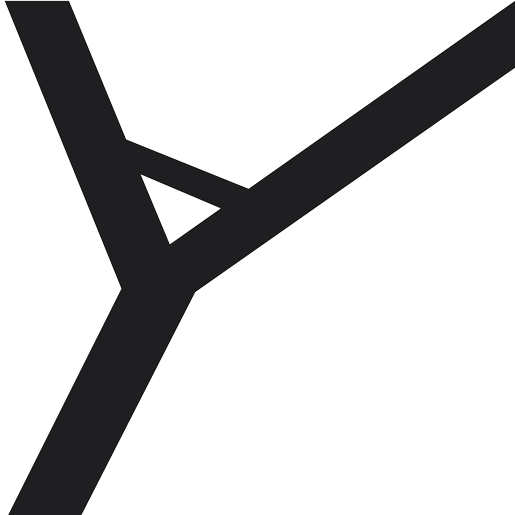THE LAST BROADCAST
by DECLAN CLARKE






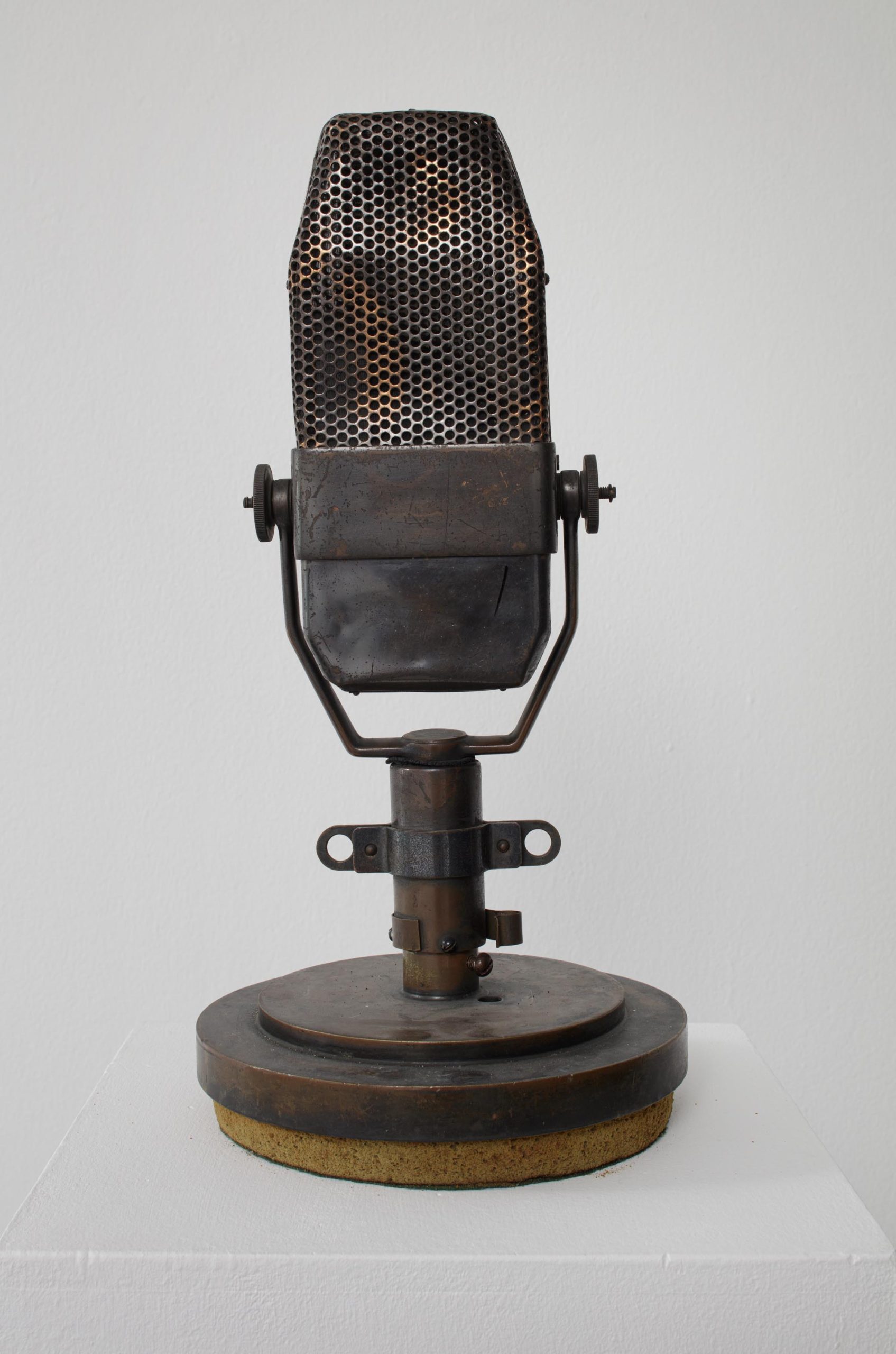
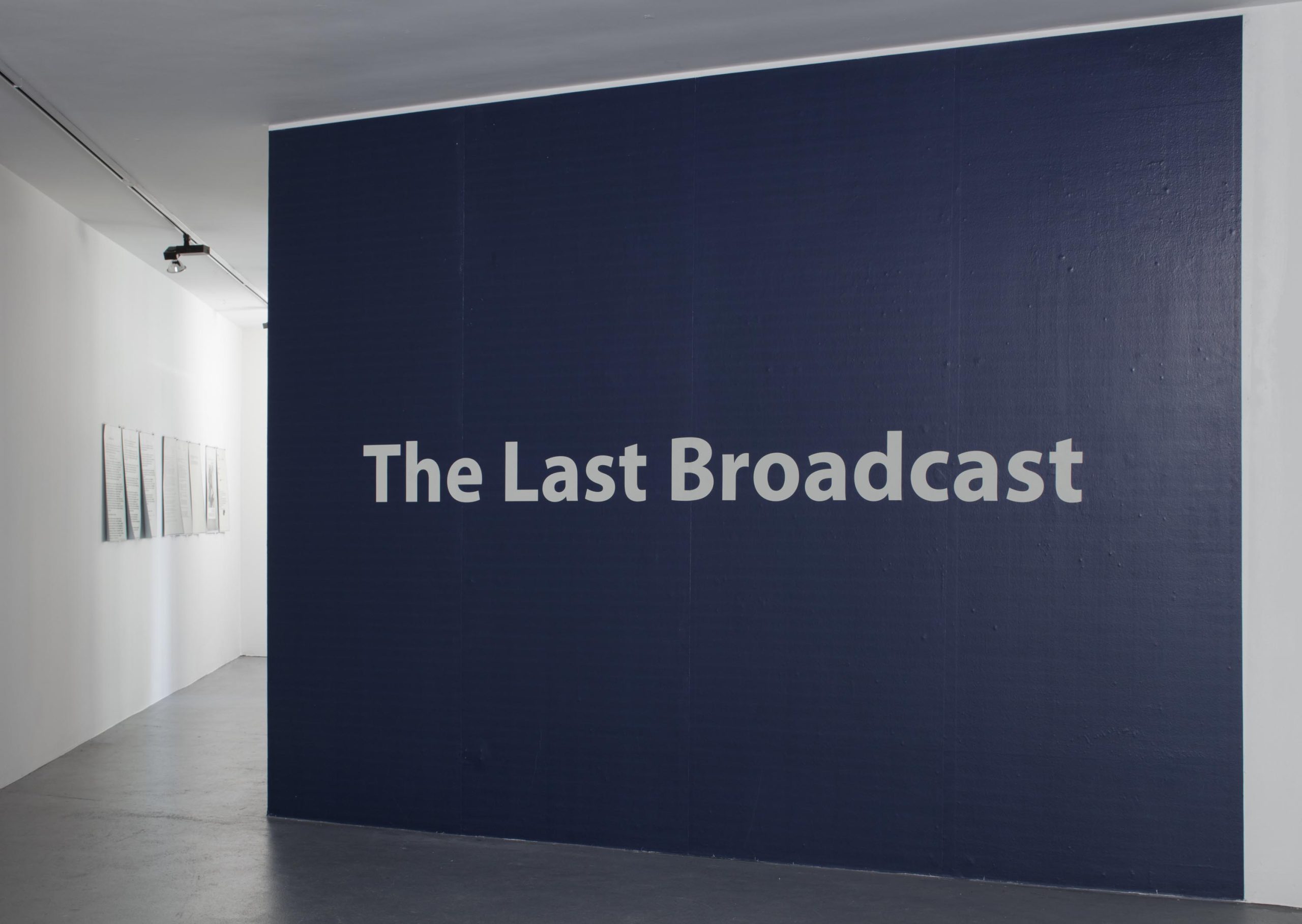
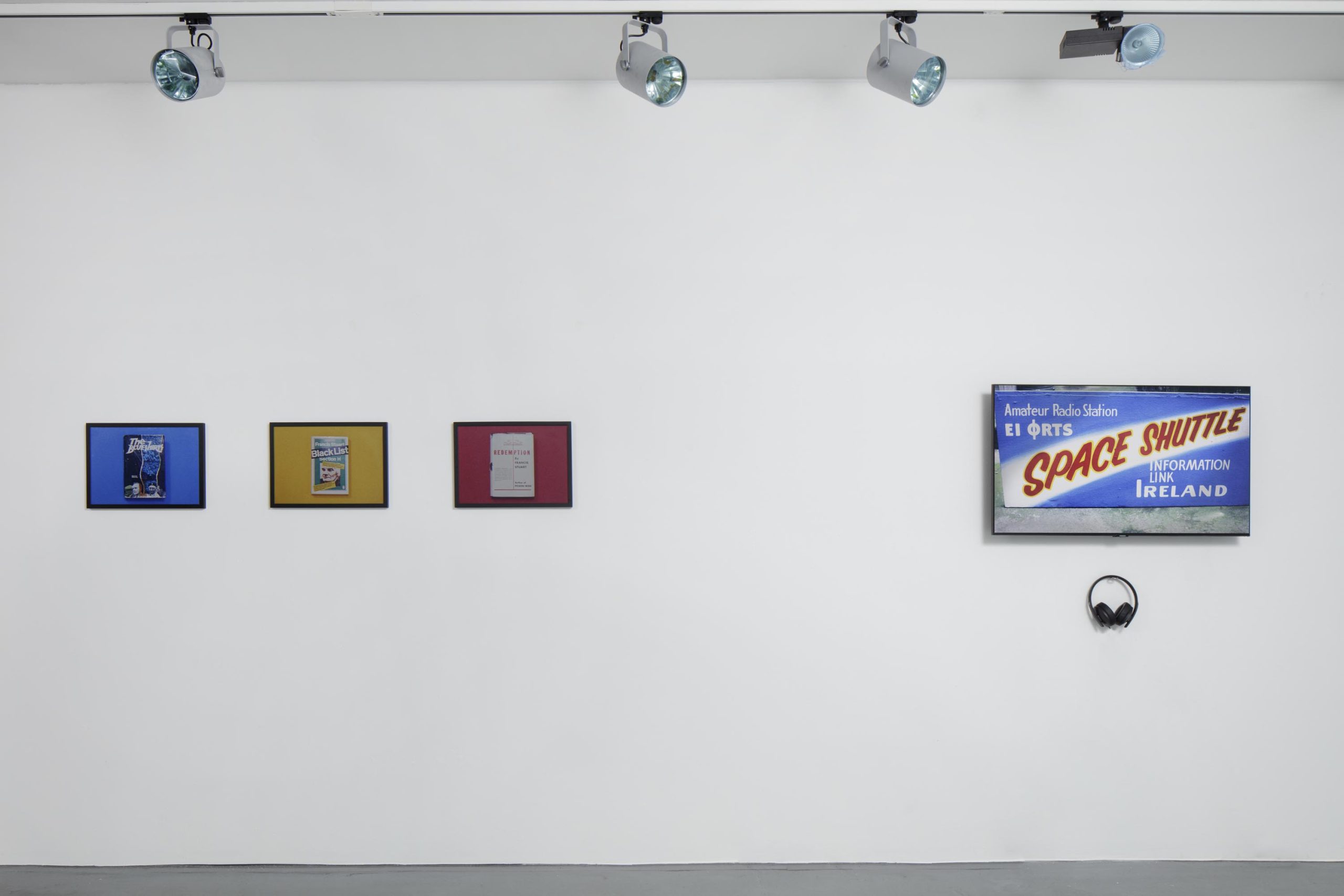











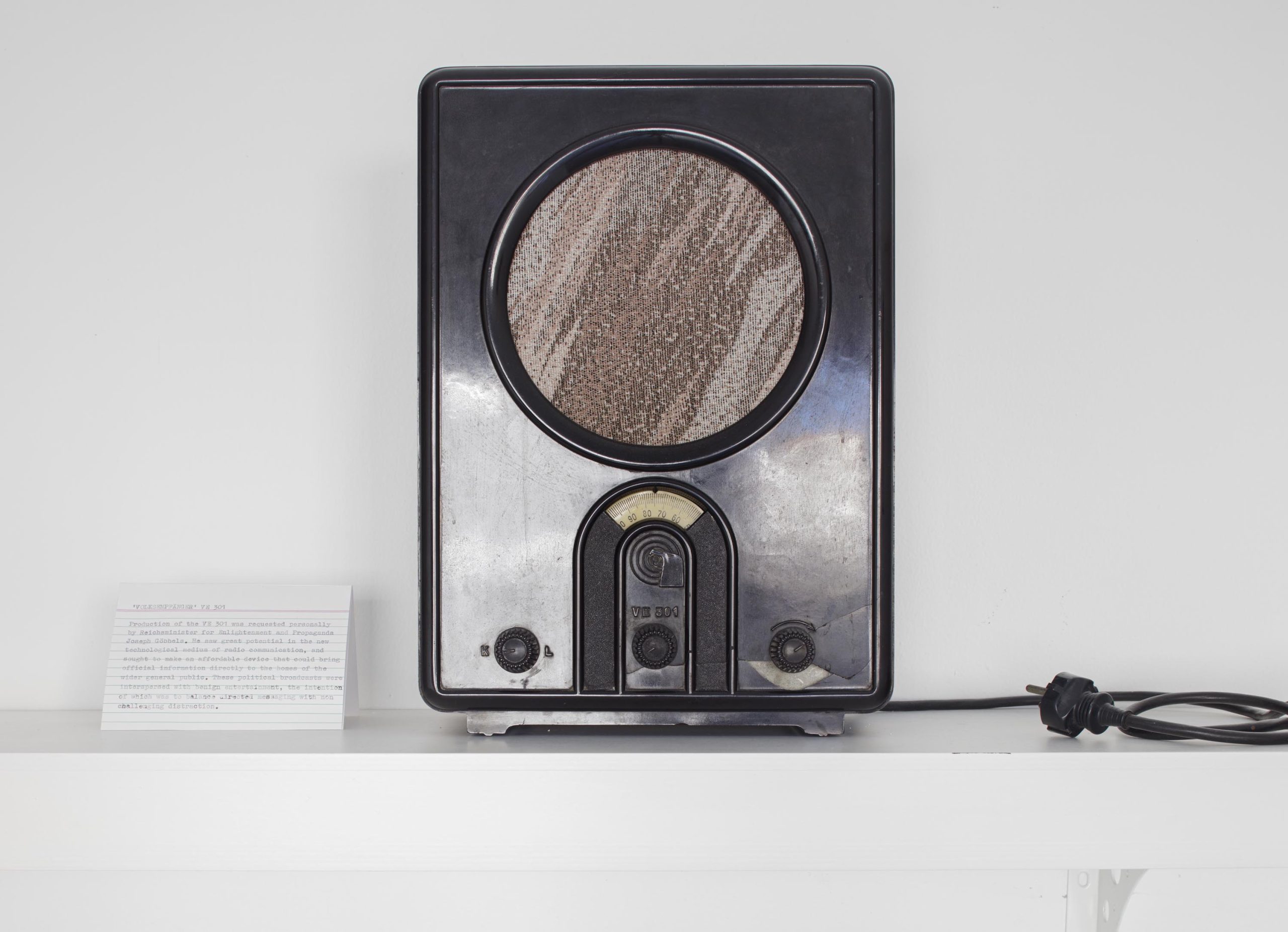




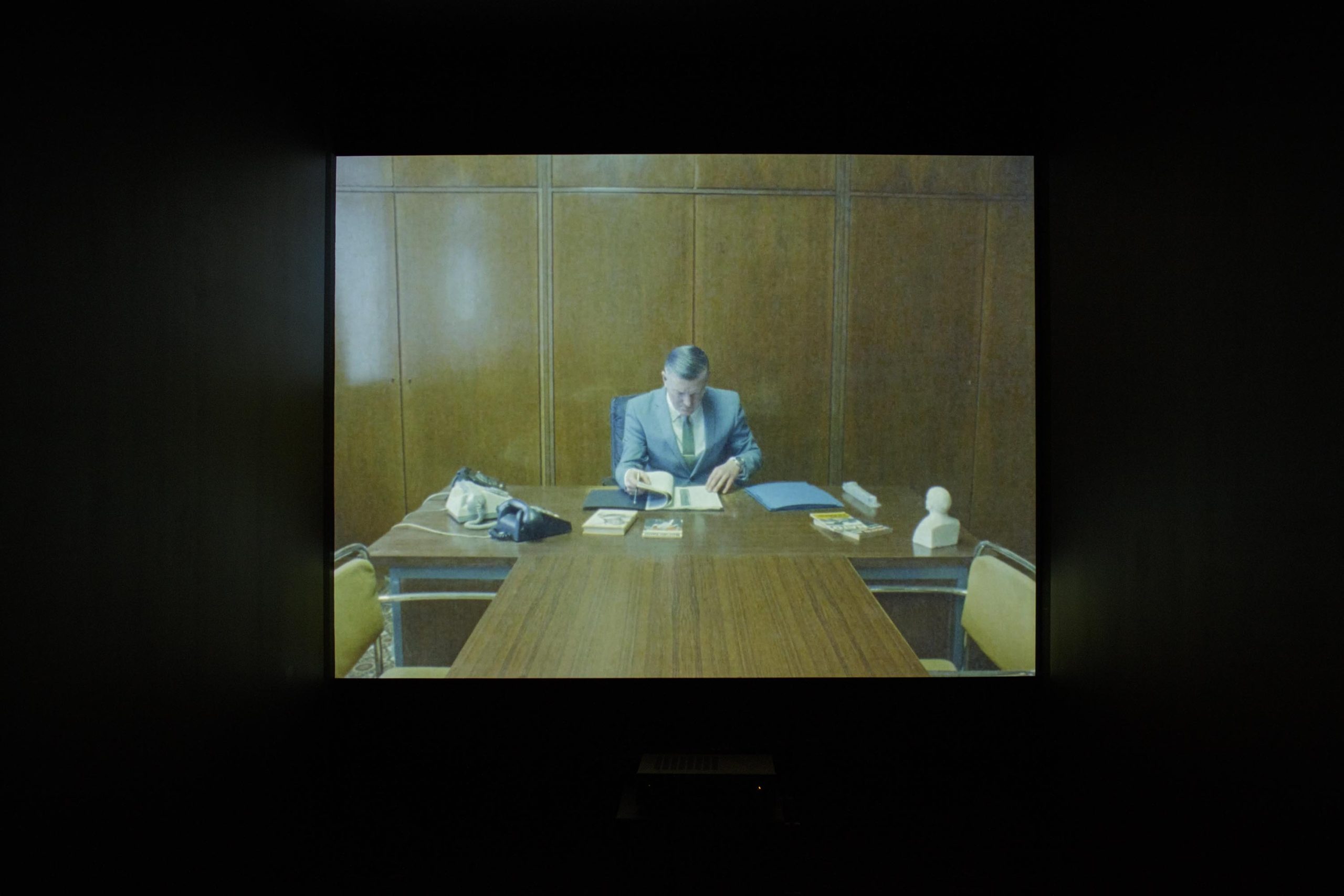



Finissage with launch of the catalogue The Museum of Broadcasting and Loneliness: April 7, 2022 | 18 h*
25.02. – 8.04.22 | Mi-Fr / Wed-Fri 14-18:00 h + nach Vereinbarung und per Zufall / upon appointment and randomly
Im Zentrum von Declan Clarkes Ausstellung The Last Broadcast steht sein neuer Film What Are the Wild Waves Saying?, der hier Premiere hat. Der romantische Titel, der auf ein Lied aus der Mitte des 19. Jhdts zurückgeht, dass einen Dialog des berühmten Geschwisterpaares aus Dickens Dombey and Son imaginiert, dient Clarke in erster Linie als metaphorische Analogie zwischen den Wellen des Meeres und denen des Rundfunks.
Tatsächlich erzählt der Film eine vielschichtige und komplexe Geschichte von Transition und Transmission, von medialer Beeinflussung, von überraschenden Zusammenhängen und gewissen historischen Parallelen zwischen einem geteilten Irland und einem gleichermaßen getrennten Deutschland, inklusive der dazugehörigen Geschichte von Desinformation und Spionage. Mit Stuart Ryan steht erstmals eine reale Figur im Mittelpunkt, die ihre fiktiven Vorläufer aus früheren Filmen des Künstlers an suspekter Undurchsichtigkeit und charakterlicher Ambiguität weit übertrifft.
Wie mehrmals zuvor arbeitet Clarke auch in diesem Film parallel im narrativen und im Dokumentationsmodus und verbindet diese mit Elementen des Noir- und Spionagegenres. Speziell für die Ausstellung im Kunstverein produziert, wird der Film von einer Installation begleitet, die Requisiten, Fotos, Texte und historische Exponate aus einem realen, aber heute geschlossenen Rundfunkmuseum zu einem assoziationsreichen Netz verwebt.
Der Film wie auch die Installation nehmen intensiv Bezug auf die Rolle des Rundfunks in Konfliktzeiten, wie er sie durch die Verbreitung politischer Propaganda besonders während des Zweiten Weltkriegs und des darauffolgenden Kalten Krieges spielte. Als in Berlin lebender Ire war es naheliegend, diese zentralen Themen anhand einer Reihe historischer Verbindungen zwischen Irland und Deutschland zu untersuchen.
Die Ausstellung hatte 2021 ein Prequel im Kunstverein am Rosa-Luxemburg-Platz und knüpft thematisch an Clarkes Einzelaustellung 2020 im Salzburger Kunstverein an. 2023 wird sie eine Forstsetzung in der RHA (Royal Hibernian Academy) in Dublin finden, wo die Gesamtschau aller ‚Museum of Loneliness’-Filme und -Installationen geplant ist.
Declan Clarke, geb. 1971, lebt in Berlin, wohin er nach seinem Studium am Chelsea College of Art (London) und National College of Art & Design in Dublin zog. Seine Filme werden auf internationalen Filmfestivals wie dem Tromsø International Film Festival , dem New York Underground Film Festival und dem FID Marseille gezeigt, wo er 2021 mit dem Georges de Beauregard International Award ausgezeichnet wurde. Er hat im PS1 MoMA (New York) der Tate Britain (London) dem HKW Berlin, dem Beijing Art Museum of Imperial City, der 2. Moskauer Biennale und dem Centre for Contemporary Art (Lagos) ausgestellt.
At the heart of Declan Clarke’s exhibition The Last Broadcast is his new film What Are the Wild Waves Saying?, which premieres here. The romantic title, which harks back to a mid-19th-century song imagining a dialogue between the famous Dickens siblings from his novel Dombey and Son, serves Clarke primarily as a metaphorical analogy between the waves of the sea and those of the radio.
In fact, the film tells a multi-layered and complex story of transition and transmission, of media influence, of surprising connections and certain historical parallels between a divided Ireland and an equally divided Germany, including the associated history of disinformation and espionage. With Stuart Ryan, a real character is the focus for the first time, who far surpasses its fictional predecessors from the artist’s earlier films in terms of suspicious opacity and character ambiguity.
As some times before, Clarke works in this film in parallel in narrative and documentary mode and combines them with elements of the noir and espionage genre. Produced especially for the exhibition at the Kunstverein, the film is accompanied by an installation that weaves props, photos, texts and historical exhibits from a real but now closed broadcasting museum into a network rich in associations.
Both the film and the installation make intense reference to the role of broadcasting in times of conflict, as it played it through the dissemination of political propaganda, particularly during World War II and the subsequent Cold War. As an Irishman living in Berlin, it was natural to explore these central themes through a range of historical connections between Ireland and Germany.
Our exhibition had a prequel in 2021 and ties in thematically with his solo exhibition in 2020 at the Salzburger Kunstverein. It will be continued in 2023 at the RHA (Royal Hibernian Academy) in Dublin, where the overall view of all ‚Museum of Loneliness‘ films and installations is planned.
Declan Clarke, born in 1971, lives in Berlin, where he moved after studying at Chelsea College of Art (London) and the National College of Art & Design in Dublin. His films are screened at international film festivals such as Tromsø International Film Festival, New York Underground Film Festival and FID Marseille, where he received the Georges de Beauregard International Award in 2021. He has exhibited at PS1 MoMA (New York), Tate Britain (London), HKW Berlin, Beijing Art Museum of Imperial City, 2nd Moscow Biennale and Center for Contemporary Art (Lagos).
* Die Eröffnung findet unter Berücksichtigung der gültigen Covid-Regeln statt (2G+ und FFP2 Maske) / The opening will be withing established covid-19 guidelines.
Film und Ausstellung wurden ermöglicht durch / film and exhibition have been supported by:
THE DAY AFTER TOMORROW
Sechs Fragen – 168 Antworten: 28 Künstler*innen wurden für das Projekt „THE DAY AFTER TOMORROW“ sechs gleiche Fragen zu ihrer Erfahrung mit der Corona-Pandemie gestellt. Das Ergebnis ist ein widersprüchliches Stimmungsbild, das Fragen aufwirft nach der prekären Situation der Bildenden Kunst angesichts der Pandemiere
18:00 h / Launch des Online-Projekts
18:30 h / Konzert des Art Critics Orchestra: im here und jazz
19:30 h / Panel mit Heidi Sill (bbk berlin), Harald Welzer (Soziologe), Andreas Templin, (Künstler) Moderation: Raimar Stange
THE DAY AFTER TOMORROW ist ein Projekt von Raimar Stange in Zusammenarbeit mit dem Kunstverein am Rosa-Luxemburg-Platz e.V. Koordination und mehr: Andreas Templin.
Das Projekt wurde gefördert durch StiftungKunstfonds / Neustart


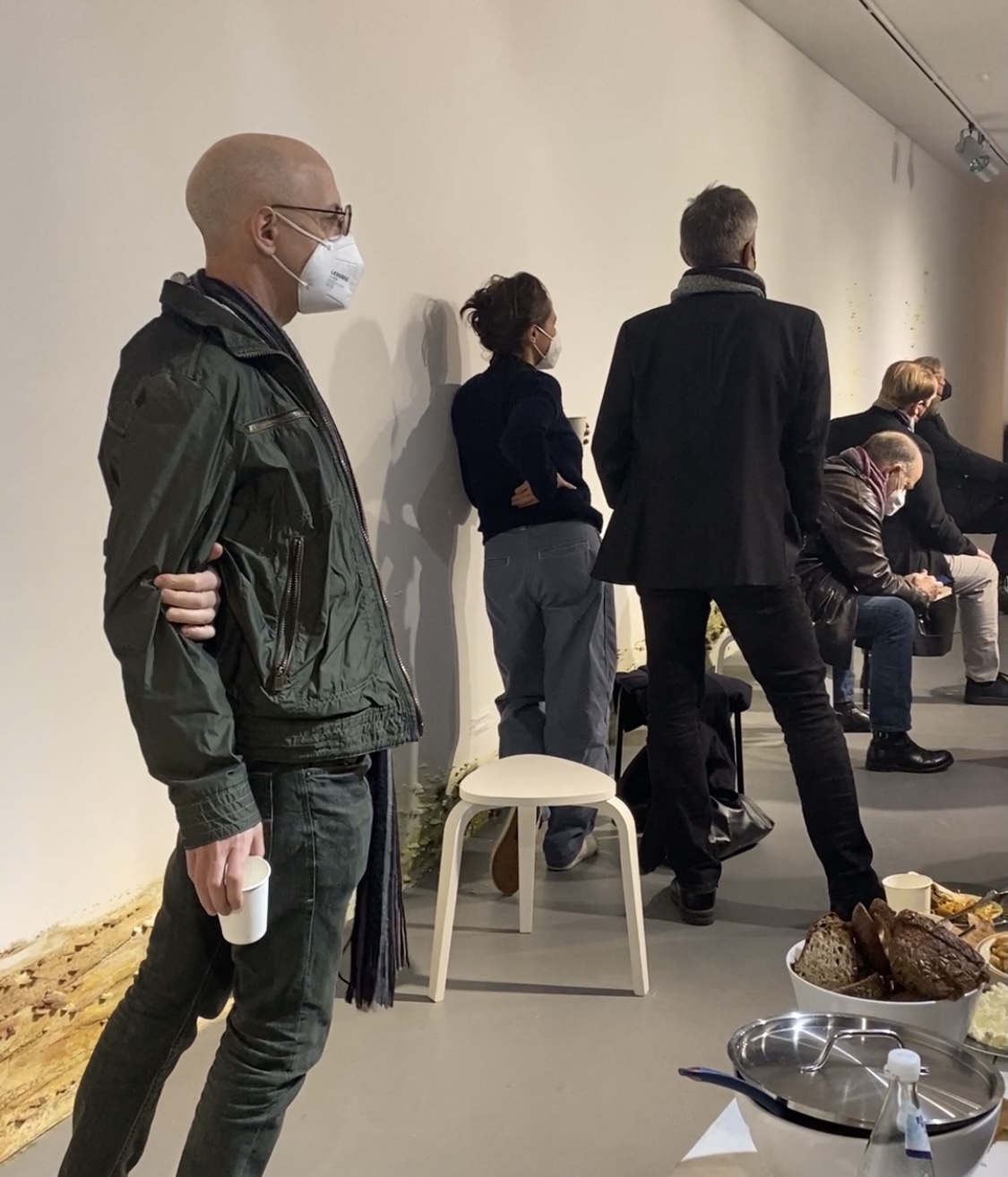

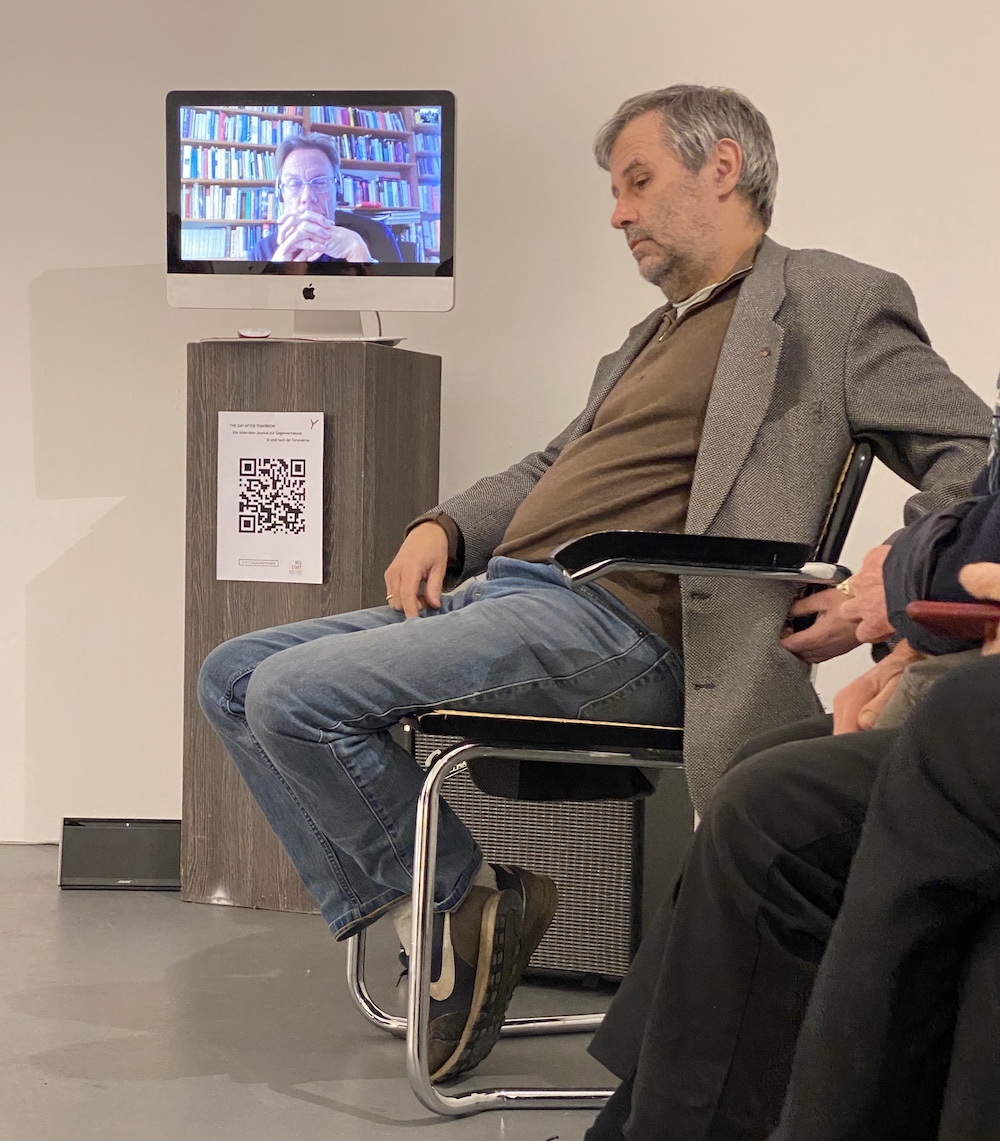
THE DAY AFTER TOMORROW - Launch
THE DAY AFTER TOMORROW
Six questions – 168 answers: For the project 28 artists were asked six identical questions about their experiences during the Covid-pandemic. The result is an multifacetted representation of experiences and opinions which raises questions about the precarious situation of the visual arts in the face of the ongoing pandemic.
18:30 h / Art Critics Orchestra Concert: im here und jazz
19:30 h / Panel discussion with Heidi Sill (bbk berlin), Harald Welzer (sociologist), Andreas Templin, (artist) moderation: Raimar Stange
THE DAY AFTER TOMORROW is a project by Raimar Stange in collaboration with the Kunstverein am Rosa-Luxemburg-Platz e.V. Coordination and more: Andreas Templin.
The project is supported StiftungKunstfonds / Neustart.


Activist Neuroaesthetics: Conference – Juli Carson
Activist Neuroaesthetics: Conference – Agnieszka Kurant
Activist Neuroaesthetics: Conference – Elena Agudio
Activist Neuroaesthetics: Conference – Anuradha Vikram
Activist Neuroaesthetics: Conference – Florencia Portocarrero and Karen Lofgren
Activist Neuroaesthetics: Conference – Jacquelene Drinkall
Activist Neuroaesthetics: Conference – Anna Munster
Activist Neuroaesthetics: Conference – Reza Negarestani
Activist Neuroaesthetics: Conference – Tony David Sampson
Activist Neuroaesthetics: Conference – Yves Citton
HAUPSTADT.TV: Kunst als Werkzeug des kognitiven Aktivismus
Activist Neuroaesthetics: Conference – Yann Moulier Boutang
Activist Neuroaesthetics: Conference – Warren Neidich
Activist Neuroaesthetics: Conference – Panel Discussion
Activist Neuroaesthetics: The Symposion – Panel Discussion moderated by Elena Agudio
Activist Neuroaesthetics: The Symposion – Cécile Malaspina
Activist Neuroaesthetics: The Symposion – Charles T. Wolfe
Activist Neuroaesthetics: The Symposion – Bonaventure Soh Bejeng Ndikung
Activist Neuroaesthetics: The Symposion – Victoria Pitts-Taylor
Activist Neuroaesthetics: The Symposion – Franco „Bifo“ Berardi
Activist Neuroaesthetics: The Symposion – Warren Neidich
Declan Clarke, Das Museum für Rundfunk und Einsamkeit / The Museum of Broadcasting and Loneliness
Broadcast 8: The Last Broadcast
Broadcast 7: A Faltering Transmission
Broadcast 6: The Domestication of Listening
Broadcast 5: The Undulating Waves That Overwhelm Us
Broadcast 4: Attempting to Survive Our Time
Broadcast 3: The Museum of the Air
Broadcast 2: From Harbour to Heart´s Content
Broadcast 1: The End of Loneliness
Die Installation wird täglich ab 16h beleuchtet und ist frei zugänglich.
Das Museum muss leider weiterhin geschlossen bleiben. Darum wird während der Laufzeit der Ausstellung eine Reihe von Kurzfilmen veröffentlicht, mit denen wir jeweils Freitags auf Sendung gehen. Die vom Künstler im Wochenrythmus neu produzierten Filme vermitteln jeweils unterschiedliche Inhalte und Themen aus dem Museum für Rundfunk und Einsamkeit.
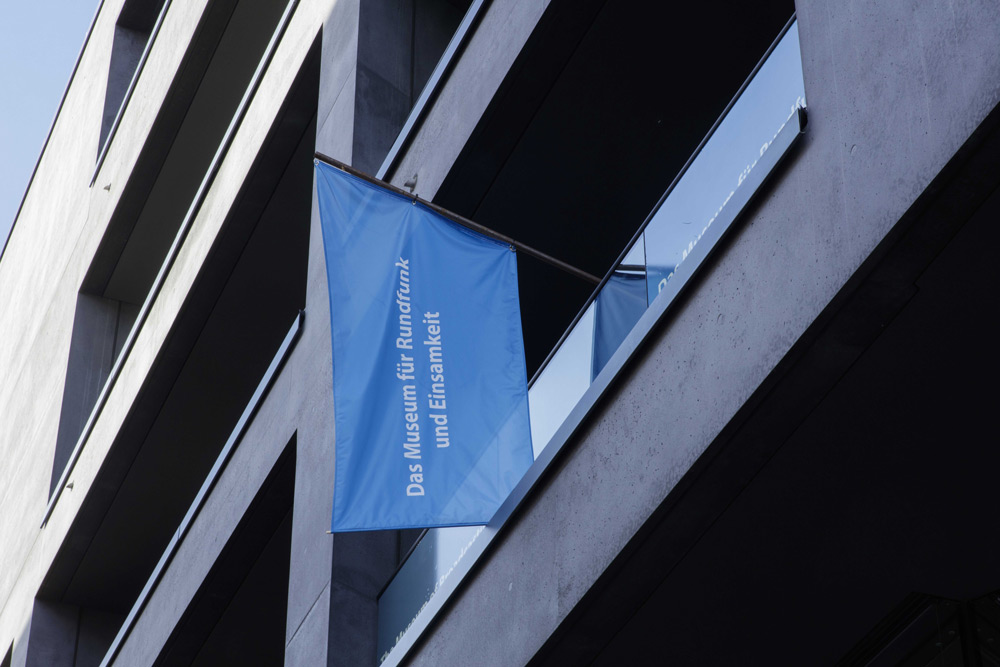



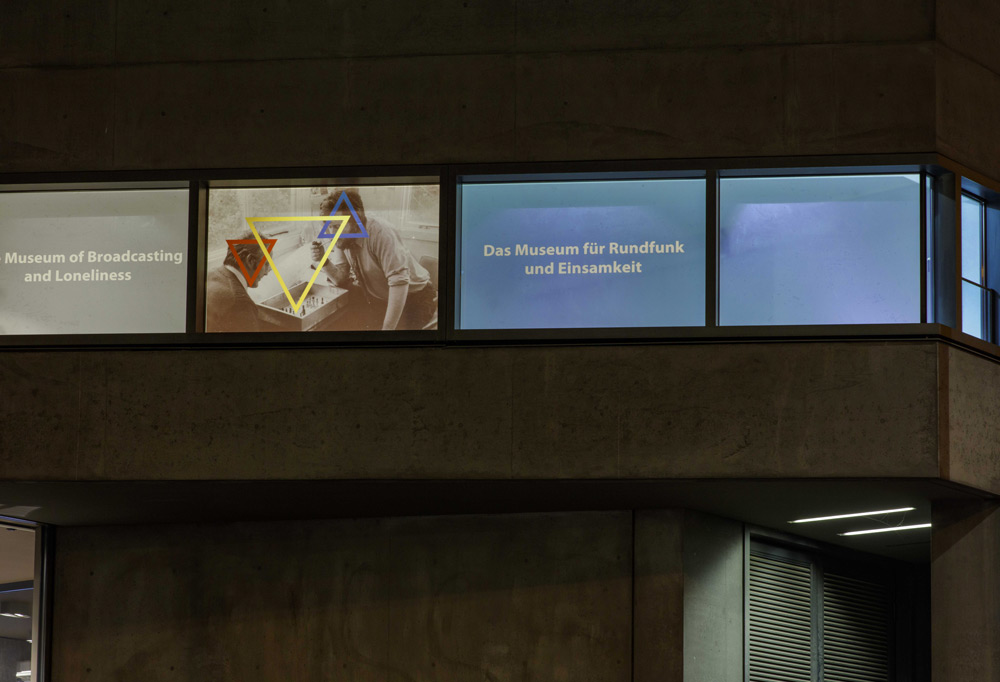
Das derzeit geschlossenen Museum für Rundfunk und Einsamkeit führt mit seinem Programm ein in die Geschichte der elektronischen Kommunikation. Das Projekt kehrt dafür zu den Anfängen der elektronischen Massenkommunikation zurück und erzählt eine vielschichtige, komplexe Geschichte von Transition und Transmission, von überraschenden Zusammenhängen und gewissen historischen Parallelen zwischen einem geteilten Irland und einem gleichermaßen getrennten Deutschland. Das Projekt versteht sich als Prequel zur geplanten Ausstellung im nächsten Jahr. Bleiben Sie dran!
Declan Clarke *1974 Dublin, lebt und arbeitet in Berlin
The installation is illuminated every day from 4pm. It is freely accessible.
Unhappily the museum has to stay closed. A series of short films will be released throughout the duration of the exhibition, each new ‚broadcast‘ arriving every Friday on this website. The films newly produced by the artist every week will relate to the content and convey the thematics of The Museum of Broadcasting and Loneliness.
The currently closed Museum for Broadcasting and Loneliness introduces the history of electronic communication with its program. The project returns to the beginnings of electronic mass communication and tells a multi-layered, complex story of transition and transmission, of surprising connections and certain historical parallels between a divided Ireland and an equally separated Germany. The project sees itself as a prequel to the exhibition planned for next year. Stay tuned!
Declan Clarke *1974 Dublin, lives and works in Berlin
Maurizio Elletrico, An ephemeral banquet for the invisible guest: waiting for the bio-aristocrat
Sven Johne, The Long Way Home
Sven Johne / The Long Way Home / HD video / 10:19 min / 2016
Premiere / Sat. 10 Dec 2016 / 7–10 PM
„The severed head of a man. He told me to take the long way home after work. Drive another round to relax. Or, if that didn’t work, here, have an Ambien. It’s good stuff, he said, you’ll sleep like a baby, he said. Or try singing yourself a lullaby.“
Mit freundlicher Unterstützung der fluentum Collection, Berlin 2016 / Kindly supported by the fluentum Collection, Berlin 2016
